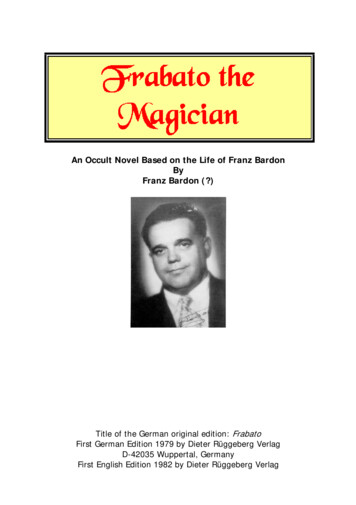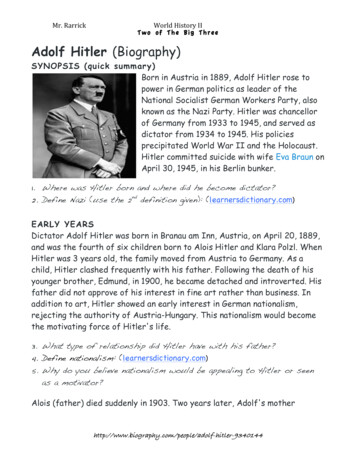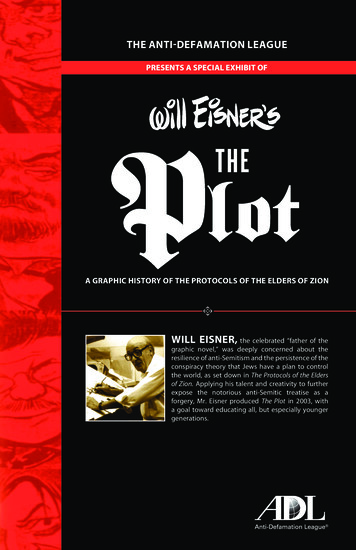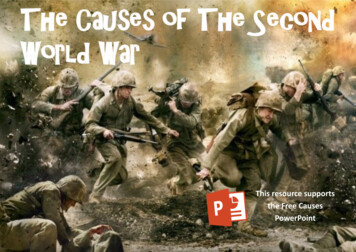
Transcription
Adolf HitlerThe Life Of The LeaderIntroduction -- By Hermann GöringPreface -- By Dr. Joseph GöbbelsThe Leader's Travels -- By SS-Brigade Leader Julius SchreckFarewell From The National Socialist German Workers' Party To Julius Schreck -- By Rudolf HeßThe Leader And The German Folk -- By Dr. Otto DietrichThe Leader As An Orator -- By Dr. Joseph GöbbelsThe Leader In His Private Life -- By SS Higher Group Leader Wilhelm BrucknerThe Leader As A Statesman -- By Dr. Joseph GöbbelsThe Leader And The German Worker -- By Dr. Robert LeyThe Leader And The Arts -- By Dr. Joseph GöbbelsThe Buildings Of The Leader -- By Architect Albert SpeerAdolf Hitler And His Roads -- By Inspector General Doctor Of Engineering Fritz TodtOur Hitler: A Radio Broadcast -- The German Folk On The Leader's Birthday -- By Dr. Joseph GöbbelsThe Leader And The Defence Force -- By Lieutenant Colonel FörtschThe Leader And German Youth -- By Baldur von Schirach, Lead Of The Hitler Youth
Introduction -- By Hermann GöringWe are unable, My Leader, to express our thanks in words. We are also unableto reveal our loyalty and our affection to you through words. All our gratitude,our love and our fervent trust in you, My Leader, can be seen glowing in thehundreds of thousands of faces turned towards you today.All our Folk, our whole nation, today feel strong and happy because inyou there has arisen not on The Leader of the nation, but also the saviour ofthe nation.The Reich Parliament President before the German Reich Parliament atNürnberg on the 15th of September, 1935.
1st August, 1914, at the Odeonsplatz, München -- Adolf Hitler in the middle ofthe enthusiastic throng greeting the English declaration of war -- photographedby Heinrich Hoffmann, later to become Adolf Hitler's official photographer.
Preface -- By Dr. Joseph GöbbelsThe idea of propaganda is associated the world over, and even still in Germanytoday, with a host of misconceptions. These misconceptions are so deeplyrooted, and often linked with prejudices, that they can only be clarified withdifficulty. Of all people, it is the Germans who, since the Great War, havelearned a lesson from experience in this respect. In this relatively short periodof time, propaganda in Germany has proved itself to be a politically powerfulforce of the first order. Today no further proof is needed that the Germanyunder the Kaisers was being undermined by Marxist propaganda, and that theMarxist democratic regime was able to be removed because it was opposed bya superior new order and power, expounded not only by the National Socialistdoctrine, but also by National Socialist propaganda.Propaganda must also be masterful. It is pointless to direct a fewresourceful men into this area now and then. As with every great art form,there are men who are particularly skilled at propaganda, who usually establisha school and then become its teachers. That there is something dishonourableor despicable about propaganda is a widespread misconception which shouldbe put aside. As in every field of human endeavour, the important thing is whatis being supported, and what propaganda brings to the practical world. In thissense it has nothing to do with publicity. At its best, it lets issues and peoplespeak for themselves, and ensures that, if they are of value, then they will alsobe portrayed and elucidated in their full value.Good things and great people have their own effect. They musttherefore be allowed to speak freely for themselves. The most importantcharacteristic of particularly successful propaganda is that it neither omits noradds anything which does not belong to the essential nature of the subject. Thecharacteristic feature of events and personalities should be brought out clearly,distinctively, and simply, stripped bare of confusing details, so that they maybe readily understood and recognised by the masses whom the propaganda isattempting to reach.National Socialism and its principal representatives have broughtalong to this art form a natural talent. They have also learnt their trade andapplied it through hard work, untiring close contact with the Folk, and acontinual refining of the techniques involved. The Leader himself was thegreatest master in this process. It is not widely known that, in the early days ofthe Party, he held no other office than that of Head Of Propaganda, and that inhis brilliant mastery of this office he gave the Party its present intellectual,organisational, and political stamp.He has also instinctively understood how to speak and deal with hisFolk, whose child he has always been and will always be. From an early time,all the love and immense trust of his followers, and later of the whole of theGerman Nation, has been focused on him. Yet, initially, the masses saw himfrom a distance only as a politician and statesman. His purely humane side
remained largely in the background.Today the whole world recognises him as the initiator of the NationalSocialist doctrine and the creator of the National Socialist State, the pioneer ofa new European order, and the guide to peace and the welfare of nations. Butbehind this recognition countless millions of people the world over suspect thatthere is a fascinating and compelling personality behind the facade of the manAdolf Hitler. Germans and non Germans alike have been captured by the greatsimplicity and simple greatness which this man radiates. He can probably bedesignated as the man who in all the world is most deeply and clearly rooted inthe feelings and thoughts of our modern time, and is therefore capable as noother man to give this time a new shape and direction.In order to understand him completely, one must know him not onlyas a politician and a statesman, but also as a human being. It is to this end thatthis book has been written. It is a testimony to his personality, and has beencompiled with affection and admiration by his closest colleagues and his oldestfellow combatants. They have put pen to paper to show the public an intimatepicture of this great man. They have all know The Leader closely for manyyears, and have learned to admire him anew on a daily basis. This is whatconstitutes the actual worth of this book.In this book The Leader is presented in his immediate relationship toall the issues of our time. The German Folk will seize this opportunity of seeingThe Leader at close range, and personally getting to know him more closely.It is pleasing to note that the book may be acquired simply andwithout great cost, a fact which will make it accessible to the masses of theGerman readership. May it find a happy and successful path into the GermanNation!Dr. Joseph Göbbels.
The Leader's Travels -- By SS-Brigade Leader Julius SchreckThe Leader promotes aviation by his example.Never before has a leading statesman got to know his country and his Folk asthoroughly as has Adolf Hitler. Whether by motor vehicle, aeroplane or train, his travelsalways served his purpose, which was to acquaint himself thoroughly with his Folk.Already at the beginning of his Movement he was far sighted in recognising theimportance of rapid means of transport, particularly the motor vehicle which he used at thattime despite its still rudimentary state of development. Even today The Leader still prefers themotor vehicle because he considers it important to remain in constant contact with hisnational comrades and his old soldiers.
At the time of the great political struggles for power, it was evident that The Leaderwas far ahead of all his opponents due to the motorisation of his forces. There were notalways crowds of enthusiastic people around The Leader cheering him on then. In those yearswe experienced many a journey where the going was very tough, and we could only secureour way through our presence of mind and through force.No alarm signals could stop The Leader from driving into the strongholds of his redand black opponents, often right through desolate scattered villages of Bolshevistorganisations, past protesting marchers. Sometimes our car was totally surrounded bythousands of fellow countrymen who had been incited to violence. However, it was ourexperience that, again and again, at the sight of The Leader, these people would suddenlydrop their raised fists. They would look up and realise that this Hitler looked completelydifferent from the one who had always been described to them. How many misled workers atthat time looked for the first time into the eyes of the man who was supposed to be theiropponent, only to become immediate and fanatical followers of his Movement? No amount ofpropaganda in the newspapers, and no books alone, could have brought about this miracle.And so, three years after his seizure of power, he could say: Where is the statesman who,after three years of rule, need not fear to go out among his Folk as I do?Trip through a small Franconian town.
The Leader in Franconia, at the War Memorial in Hiltpolstein (Franconian Switzerland)When his work and his official duties permit it, then you will find The Leader not onlysitting in his office, but driving out into the country amidst his Folk. Sitting in his Mercedesagain, he will appear sometimes here, sometimes there; one day in the Ruhr, the next inBaden, Württemberg, Saxony, East Prussia, at the coast. In brief, there is no district where histravels do not take him at least once. At the wheel of the car behind the windscreen, I thensuddenly hear the amazed and enthusiastic cries: It's Hitler, or: The Leader is here. Often thepeople do not even notice who has just driven through the town. Not until the convoy hasmoved on do they become aware of the three black cars, and then all at once they realise whohas just driven past. The children are, in the main, the first to recognise The Leader. Themoment this happens, there is a race with the car, and then in a little while people gatheraround the car, several streets are alerted, and finally we will have to stop a number of timesso that The Leader can shake hands with enthusiasts, accept flowers offered to him, and attimes autograph a few cards.
During a trip through Germany in his first car, his seat was already next to the driver.Whoever has been fortunate enough, as I have been, to be constantly by TheLeader's side and participate in his many journeys, will have thousands of unforgettablepictures imprinted in his mind in the course of the years. Such journeys leave you with anenormous belief in the German Folk and an immense feeling of warmth.Major journeys are undertaken by The Leader only in an open vehicle, which herefuses to close even if it rains in the course of an official visit. To the advice of his entouragehis only response is always: As long as the SA and the other groups have to stand in the rain,we can get wet as well. Thousands were witnesses as he inspected, bare headed and dressedonly in his brown shirt, the marchpast of the SA at the reintegration of the Saar, as he spoketo the waiting crowds in pouring rain after a night flight at three o'clock in the morning at theelection campaigns in Stralsund, or drove in the rain through Holstein to the Adolf HitlerReclamation, with no consideration for himself, because the SA was also standing in the rain.
On his journeys through Germany, The Leader prefers an open vehicle.Trip through the Harz. Even The Leader can be cheerful.
Rest in the forest.The Leader on a flight.
On top of the Wartburg.Today, after fifteen years, as Chancellor Of The Reich, he has not given up this habit.He also determines the route himself, because The Leader loves to use the side streets andexperience Germany's countryside away from the major highways.Before, when The Leader was not as well known as today, it was often easier. Thenthere were times when we could spend the night or have a meal in a small inn. Today it isquite different. The news of the arrival of The Leader spreads like wildfire in the villages andtowns through which we pass. Many people are overjoyed and telephone the next village topass on the news, and then the villagers, who have not yet seen their Leader, will be waiting atthe entrance of the town to greet Hitler as he arrives. There are then such impressivemoments that many a time I have wished I were a poet so that I could find the words todescribe the myriad of minor occurrences with the impact with which I experienced them.We arrive in a town. Everyone is there, the old and the young, mothers with youngchildren in their arms, clubs and schools. The main street is quickly transformed into a sea offlags. The girls in the BDM try to stop the car, but time is pressing and The Leader must be athis destination at a certain time because hundreds of thousands in the gathering will bewaiting for him. Then a large strapping fellow, the blacksmith of the village, suddenly jumpsonto the bonnet of the car; now The Leader is forced to slow down his trip, and already the caris surrounded by the villagers. Everyone wants to shake The Leader's hand. Women withchildren in their arms cannot get close. They hold their children, Germany's future, above theheads of the enthusiastic crowds, as if they wanted to say: You belong to him!
Travelling.In the German countryside. Hiltpoltstein (Franconian Switzerland)The Leader determines the route.
If one wants to describe great men, one also has to see their smaller traits. One of ahundred such episodes comes to mind. It is around ten o'clock at night as The Leader isdriving towards Würzburg after a marchpast in Meiningen. Then, in the glow of the headlights,we see two SA men marching along. The Leader stops the car. They are asked where they aregoing. To the nearest railway station. My comrade can't walk much further. We still have threehours ahead of us.Then jump in! They have no idea whose guests they are. We ask them a number oftrivial questions. Then we ask them if they have already seen The Leader. Yes, today, duringthe marchpast. The car stops, we have reached our destination. The Leader, who is sitting inthe front, calls to them and presses a sum of money into their hands. Then, in the darkness ofthe night, a small ray of light illuminates The Leader's face. The two SA men are paralysed.Wasn't it The Leader who had just spoken to them? Yes, it's him! No words can pass their lips.They are overcome by joy. I put my foot on the accelerator and we drive off into the dark night.As we turn a curve we see the two of them still standing motionless on the side of the road,dumbfounded by what they have just experienced.The D-2600 above Nürnberg. Arrival at the Party Conference Of The Reich.
Election trip through Germany.The major election campaigns at that time required The Leader to utilise his time tothe maximum, and so The Leader would often make use of aircraft. This was at a time when airtraffic was still a cause for apprehension. For weeks on end an aircraft would take him fromtown to town, with no consideration for wind or bad weather.Looking back at this time, I experience a slight shudder when I remember thenumerous flights through storms, fog and dark nights. It says a lot that, at the time when theaircraft figured prominently in The Leader's election campaign, the schedule for the take offwas never changed. Every meeting which had been planned -- and at times there were 4 or 5 invarious towns in Germany on the one day -- was carried through on time.Often The Leader was advised not to go through with a certain flight. However, hisanswer was always: If need be, then I will also fly through a storm. How the opposition wouldhave rejoiced at that time if the scheduled flight plan had not been carried out or a plannedmeeting had been cancelled. But Hitler did not do them that favour.Of these flights, one in particular has stayed in my memory. This was the flight fromFurth to Frankfurt. The old Rohrbach, the first machine which The Leader used at that time,was anchored with fuel drums. Over the whole of Germany there was a storm the intensity ofwhich we rarely experienced. All general air traffic was banned. Only with difficulty could wewalk upright. Everyone shook their head when The Leader boarded the aircraft. Yet, after a fewminutes, it was already struggling to take off. Laboriously the aircraft made its way throughthunderstorms, heavy gusts of rain and snow. Often the aircraft would suddenly plunge andthe heads of many of the passengers hit the roof, but each time the flight continuedsuccessfully. Once the plane was forced to make an unscheduled emergency landing longbefore we reached our destination. The meeting in Kiel was to begin at 8 o'clock. At 5 o'clock Iwas informed that The Leader had had to land at Travemunde due to the low clouds, fog andsevere storms. Immediately the convoy sped off towards Lübeck and near Eutin we were topick up The Leader who was driving towards us in a hire car and bring him to Kiel on time.Even if nowadays, due to the pressures of time, The Leader avails himself of traintravel now and again on his night journeys, his great love is still for the motor vehicle, ofwhich he himself once said that it opened up Germany for him. Likewise his love is for his Ju
52 under the command of Captain SS-Oberführer Baur, who must number among the firstgeniuses of Flight Captains. The most pleasurable thing for The Leader is when, after manystrenuous weeks, he can once again drive through the German countryside in his car. Themost pleasurable days for me are then when I can sit behind the wheel and, as once throughwar and deprivation, now drive The Leader through a happy and peaceful country.On the Bückeburg for the Harvest Festival of 1934.The Leader leaves the Landsburg Fortress, 1924.Women from Bückeburg in their festival costumes during the Harvest Festival in 1934.
Farewell From The National Socialist German Workers' Party To JuliusSchreck -- By Rudolf HeßThe National Socialist Movement today takes leave of Julius Schreck. It takesleaves of one of its oldest and most faithful members. It takes leave of one ofits best and most irreplaceable members. It takes leave of one of its mostmodest members, who wanted nothing for himself, who gave everything forGermany and for The Leader.When it was a question of fighting for Germany, he stood at the front,whether it was in the World War or at home.Boundless was his admiration and his love for The Leader, untiringhis concern for The Leader, prudent his care for the protection of The Leader.His nature radiated dependability to the last. His presence spread afeeling of security among his Party members in times of difficult struggle.Unerring was his judgement of people, unequivocal his affection aswas his aversion. A tough old warhorse with a warm heart. Feared by hisopponents, loved by all who considered him one of themselves, honoured as afatherly friend by his subordinates.He had the good fortune of enjoying the highest trust of his Leader.The Movement lowers its flags in a last greeting to Julius Schreck. In doing so,it swears to him that his behaviour and his spirit will be an example to theyoung and to generations to come, and that he will thus serve the Movement inthe many years that lie ahead to the glory of our great National SocialistGermany.
Julius Schreck -- died 15.5.1936.
The Leader And The German Folk -- By Dr. Otto DietrichThe relationship of the German Folk to The Leader is a constantsource of joyous pride to the Germans themselves, and a cause of amazementand surprise for the rest of the world. Nowhere else in the world will you findsuch a fanatical love of millions of people for one man, a love which is notexcessive, nor ecstatic, but rather the result of an immense and deep trust, asupreme confidence, such as children sometimes have for a very good father.During a trip through East Prussia, The Leader visited a peasant family.Enthusiasm lasts for only a few years; this love from the depths ofthe soul, however, once manifested, is indestructible, and will last forcenturies. It is like a large, powerful flame, remarkable for its constancy. It is alove which has not suddenly flared up or been lit by unexpected and stirringevents, but one which has grown slowly and insistently. It does not break outwith wild impetuousness on any one single occasion, but is always there, atany time and in the heart of every German, whether it is triggered off bysomething in particular that fills his heart with pride, or whether he gatherstogether with hundreds of thousands of other fellow countrymen to listen toThe Leader -- or whether there is no external reason at all, and it manifestsitself in a moment of quiet reflection during the course of his daily work.Whenever anyone thinks of The Leader, there is always a deep love which riseswithin him and of itself justifies the statement: Hitler is Germany -- Germany is
Hitler. Never before has any man been closer to the heart of every German asthis man, who himself came from their midst. He did not come from outside,but was born in the cradle of the nation, having felt its sorrow and lived its life,and if anyone today were to ask the name of the unknown German soldier atthe Front, then the whole of the German nation would answer: Adolf Hitler.On the day of the reintegration of the Saar.Enthusiastic crowds in the presence of The Leader in the Port Of HamburgDelegation from the Saar in front of the Imperial Chancellery.He was the conscience of the nation; from him came the cry of
suffering and also of defiance of an oppressed Folk; in him the will to live of thewhole of Germany at the hour of its greatest humiliation became word anddeed. Adolf Hitler never once uttered a single word than those which the Folkthought in the depths of their souls, never once committed an act than thosewhich the entire country would have wanted. He was never, is and will neverbe a dictator who imposes his personal opinions and his desire for power onthe Folk. He is really only a leader, which is the greatest thing that can be saidof a man. This is why he is so beloved by the Folk, this is why he is so trusted,this is why his Folk are so unspeakably happy. For the first time in its historythe German Folk have become themselves.She wants the hand of The Leader.Everyone wants to shake The Leader's hand just once.
Even the peasants believe in The Leader.Herein lies the secret of the indestructibility of Adolf Hitler and of hiswork, the assurance of the irrevocability of the path he has adopted, becausehe is no longer the man Adolf Hitler, it is no longer his work, no longer his path,but it is the German Folk themselves who express themself through him. Inhim the Germans love themselves, in him they follow their most secret wishes,in him their boldest thoughts become reality. Every single person feels this,and for that reason Adolf Hitler is a stranger to no one and no one is a strangerto The Leader. Workers and peasants, Nobel Prize winners and artists, soldiersand dreamers, the happy and the desperate, speak to him, and everyone hearshis own language, understands and is understood. Everything is done withoutdesign and in a completely natural way, and no one stands in awe of the greatman. No one is ordered about, no one is courted, but everyone is called on ashe was called on by his own conscience, and he can do nothing but follow if hedoes not want to feel guilty and unhappy in his own mind. So what musthappen happens of its own will, and no Folk on Earth are freer than the GermanFolk.The Leader's eyes -- Father's eyes.
Thus the German Folk do not tire of listening to the words of TheLeader, and if the party conference of the Reich in Nürnberg were to last twiceas long, the Folk would still stand there on the last day as they did on the firstand listen. He could drive through Germany continually, the Folk would waitday after day beside the road as they did on the first day and cheer him on,bringing him their children so that he could gaze at Germany's future. If theyhad to, they would also give him their lives as hundreds of his Party membersdid in the years of fighting.There have been emperors and kings, sovereigns and folk heroes,upsurgers and men of terror, clever and great rulers at the head of nations, butnever before has there been a man like The Leader. This is unique and is thegreat fortune which has been given to the German Folk. As long as one doesnot appreciate this, one cannot appreciate anything about the German Folk,one cannot understand why their eyes light up, their voices cheer, their armsfly up, their hearts beat faster when Adolf Hitler appears before the GermanFolk. And from these external signs which show the constant and mysteriousattachment between the people and The Leader, Hitler again draws strengthfor new works, just as the Folk draw strength from his sight.This is seen particularly when the youth of Germany and The Leadercome face to face, and whoever has spent some time with The Leader and beenable to accompany him in these days, weeks and months, will have a store ofunforgettable pictures.Between Stettin and Pasewalk, a distance of at least ten kilometres,young Germans had taken up their positions in the middle of the country roadin the rain and storm, because they had heard from someone somewhere thatThe Leader would pass this way today. Evening was falling, and when TheLeader's car with its two escort cars roared along the road, far ahead in thedistance between the trees lining the road, a crowd could be seen. As the carsdrew nearer a throng of flagwaving children came into view. They were burningred, blue and green Bengal matches, and a number of children were standingguard before the bulk of the group to indicate by their waving hands that theconvoy was to stop. Even though time was incredibly short, The Leader stillgave the order to stop, and at that moment the cars were surrounded by abouta hundred children who jumped not only onto the running boards but evencrept onto the radiators and bonnets in an attempt to catch a glimpse of TheLeader inside the car through the windscreens.
Old people trust The Leader.
A photograph of the election campaign in Hessen in 1932.After the three cars in the convoy had been thoroughly inspected inthis way, a particularly resourceful lad finally caught sight of The Leader. Hescreamed at the top of his voice: He's here, everyone over here! -- and theneverything happened. The escort command had to step in because a number ofboys were even trying to climb onto the swaying canvas hood of the car. TheLeader of the young Troop, the same young boy who had discovered TheLeader, held a short speech, young, fresh and carefree, and then everyonemade way for a young girl dressed in white. The girl curtsied deeply and thenrecited a poem she had composed herself about the joy young people had inseeing The Leader. When she finished the child handed Adolf Hitler a smallbasket of rosy red apples.Deeply moved, The Leader stroked her blond hair, upon which thechild suddenly burst into tears of overflowing joy and happiness. Slowly theconvoy then moved away from the host of children, and for a long time the flagwaving little figures could be seen through the rear windows of the carsbidding their farewells.At every rally it is always the children who stand in the front rows.
The well behaved and unassuming ones stand there just as their teacher orTroop Leader has placed them, in straight rows and not moving from theirspots. The more bold ones among them, however, hang in the trees, sit onmemorials and the ledges of buildings, or stand like an avenue of living statueson top of tall factory walls, perch on flag poles and lantern poles, and,wherever The Leader passes, fill the air with their endless cries of joy. Thefavourite places where children await The Leader have always been sharpbends in the road. By their clever positioning they render these bends evensharper and force the cars to drive as slowly as possible. Better still if onecomes upon a construction site somewhere on a country road. Here it is quitecertain that The Leader will only be able to proceed at a very slow pace, andthe opportunity to capture him will definitely present itself. It then inevitablybecomes a real effort to extricate oneself from the crowd. When finally a pathopens up in front of the cars, the children will run from behind the car only toblock the way again with their joyous cheers.Once in a town in the south of Germany, on the evening of a rally forThe Leader, tens of thousands of Hitler Youth formed a guard of honour in thestreets. The further the line extended, the tighter the two walls of the guard ofhonour were pushed together, so that, finally, there remained just enoughroom for the car to squeeze through. At first everything went well. Suddenly,however, there was much running, pushing and shoving, and while initially thetorchlight bearers standing in the front row managed to contain the crowd,they were suddenly carried along and pushed towards the cars. Their torchesshone into the insides of the cars, and in their enthusiasm and love, they gaveThe Leader and his entourage a heavy portion of smoke to inhale. It wasfortunate that they did not set fire to the cars themselves. Only after a quarterof an hour did The Leader succeed in extricating himself again from thisenthusiastic crowd of young people.It is amusing to see the seriousness and eagerness with which theyoung people endeavour to photograph The Leader. They stand there with theirtiny cameras, shaking with nervousness and excitement, their finger on thebutton. From the sight of these cameras you would think that it would only besheer luck if a photo were to succeed. And yet it is just among these snapshotsthat you find a surprisingly large number of good photos. Here also luck seemsto be on the side of the young people, because, on the other hand, experiencedamateur photographers often complain tha
his brilliant mastery of this office he gave the Party its present intellectual, organisational, and political stamp. He has also instinctively understood how to speak and deal with his Folk, whose child he has always been and will always be. From an early time, all the love and immense trust of his followers, and later of the whole of the










